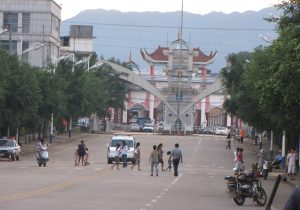Another important rebel group in Myanmar has announced that it is willing to engage in China-brokered talks with the military junta, with the aim of ending more than a year of fighting in Shan State along the Chinese border.
In a statement issued this morning, the Myanmar National Democratic Alliance Army (MNDAA) declared a unilateral ceasefire and said that it planned to dispatch a high-level delegation “to engage in dialogue and consult with the Myanmar military and resolve conflicts and differences through political means.” In return, the MNDAA demanded that the junta cease its air and ground attacks.
“Under the mediation of China, we are willing to engage in peace talks with the Myanmar army on issues such as Lashio,” it said, referring to the major town in northern Shan State that the MNDAA captured in early August. While pledging itself to political dialogue, the group added that it “will continue to uphold the right to self-defense as before.”
The MNDAA is a member of the Three Brotherhood Alliance of resistance groups, which has inflicted a series of serious defeats on the Myanmar military over the past year. As part of its Operation 1027 offensive, which began in October 2023, it has seized control of an arc of territory in northern Shan State abutting the Chinese border. The offensive culminated in early August with the MNDAA’s seizure of Lashio, the de facto capital of northern Shan State and the seat of the Myanmar military’s Northeast Regional Command.
In addition to humiliating the military high command, the advances of the Three Brotherhood Alliance have weakened the military’s hold on northern Shan State and brought the Alliance and allied People’s Defense Forces one step closer to launching large-scale attacks into Myanmar’s central dry zone.
The MNDAA’s announcement that it is willing to return to the negotiating table is an obvious result of China’s increasingly forceful efforts to direct the course of the conflict in Shan State. Fearful that the collapse of the military junta would imperil its strategic and economic interests in the country, Beijing has strongly opposed the second phase of Operation 1027, which began in late June with the collapse of a China-brokered ceasefire. While stiffening its support for the military council in Naypyidaw, it has brought considerable pressure to bear on the Three Brotherhood Alliance to halt its offensives and return to the negotiating table.
To do so, it has shut border gates adjoining territories controlled by the MNDAA and its ally, the Ta’ang National Liberation Army (TNLA), and also used its considerable influence with the United Wa State Army, arguably the most powerful ethnic armed group in Myanmar, to deny these groups access to electricity, water, internet connections, and other supplies. Earlier this month, reports emerged that Chinese authorities had detained the MNDAA’s commander, Peng Daxun, and placed him under house arrest in Yunnan, in a bid to force him to withdraw his forces from Lashio. (Beijing later said that Peng had come to China for “medical care.”)
The MNDAA’s announcement comes a week after the TNLA said it was willing to hold talks with the junta and acknowledged the Chinese government’s efforts to broker a settlement. These announcements suggest that China’s attempts to solidify a new status quo and prevent the full collapse of the military junta in Shan State are bearing some fruit. While the MNDAA and TNLA have both pledged themselves to the overthrow of the military junta since the coup of February 2021, their core political aim – to establish autonomy in regions under their control – is in principle not incompatible with continued military rule at the center.
However, as I wrote at the time of the TNLA’s announcement last week, it remains unclear whether China’s influence can force a lasting political accommodation.
A large amount of distrust now exists between the junta and the Three Brotherhood Alliance, whose third member, the Arakan Army, continues to make inroads against the remaining areas of junta control in Rakhine State, in western Myanmar. The Myanmar military has not yet acknowledged the TNLA’s announcement that it is willing to enter talks, and as the AFP news agency noted, local media reports suggest that the junta has continued to launch air strikes on TNLA-held territories.
Moreover, while both the TNLA and MNDAA have close relations with Chinese authorities across the border in Yunnan province – especially close ones, in the case of the latter – neither are quite Chinese proxies; both have their own political goals to which they remain strongly committed.
In this regard, it is worth remembering that the MNDAA released a similar statement in September promising that “it would cease fighting immediately and cooperate with China to solve Myanmar’s conflicts through negotiation.” Within weeks, it had returned to the offensive.

































